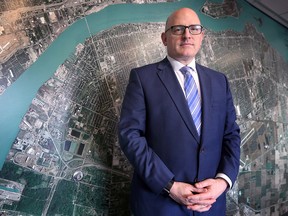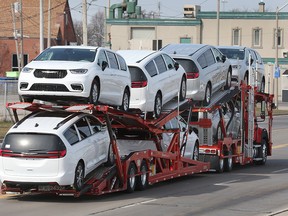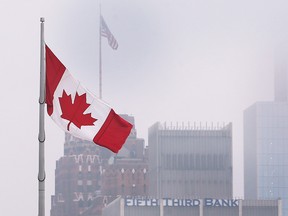Windsor has been on the frontlines of Canada-U.S. relations for the entirety of its existence, through war and peace, boom and bust
Windsor has been on the frontlines of Canada-U.S. relations for the entirety of its existence, through war and peace, boom and bust

When on war footing there’s nothing like a good war story from past victory to rouse troops, and Drew Dilkens, the mayor of Windsor, Ont., found a good one.
Dressed in a dapper, three-piece blue suit, his tie in a proper Windsor knot, Dilkens stood with his back to the windows inside the city’s riverfront St. Clair Centre for the Arts. His audience at the local Chamber of Commerce event last month couldn’t miss the skyline framing him on each side: the skyscrapers of Detroit’s Renaissance Center, home to the world headquarters of General Motors just across the river.
Dilkens didn’t miss it either.
During the War of 1812, he said, American cannons were placed along Detroit’s waterfront aimed at what was then called Upper Canada, likely right at old Sandwich Town, now a part of Windsor just a few kilometres west of where Dilkens was speaking.
“Although there are no recorded accounts of these cannons ever being fired, surely those alive at that time, living here, felt the weight of that threat from our neighbours across the river,” he told the midday crowd. “Today, so too, do we feel the potential of an economic threat on our country,” he said of U.S. President Donald Trump’s threatened tariffs on Canadian imports, what would be the opening salvo starting a tariff war.
“In Windsor, we are ground zero for the impacts of tariffs and this threat we must take seriously.”
The analogy might seem florid to some, but in Windsor, perhaps of all places, it feels ominously appropriate. Trump’s tariffs and threats of annexation make it seem an existential crisis.
Dilken’s State of the City speech on Feb. 13, was unusual not just for its wartime rhetoric, and not just as a tough-talking message for local businesses. It stands as a rousing call to arms for all Canadians.
Windsor is seen as a canary in the coal mine — the warning alarm — for the country’s economic fortunes under Trump.
Dilkens has been mayor of Windsor since 2014, but Windsor has been on the frontlines of Canada-U.S. relations for the entirety of its existence, through war and peace, boom and bust.
The border makes the city special, lying as it does on the bank of the Detroit River, with the city of Detroit just 600 metres across the Ambassador Bridge, the busiest international border crossing on the continent. A curve in the river as it cuts from Lake St. Clair to Lake Erie gives Windsor the geographic oddity of needing to head north from Canada to get to the United States.

Detroit’s once mighty status as the world’s automotive capital, home to what was known as the Big Three auto makers, shaped cities on both sides of the border.
“The auto industry is to Windsor what water is to fish. It’s the start and the end,” said Flavio Volpe, president of the Automotive Parts Manufacturers’ Association, the national organization for auto suppliers.
“Cars are made in the area. Parts are made in the area. Tools are made in the area. Skills are learned in the area. And almost every business vertical in the area either helps deliver all those goods across that bridge, or services the delivery of those goods, or services the community that makes them.
“Everything. Everything in Windsor comes back to automotive.”
So, when Dilkens talks tough about U.S. tariffs on steel and aluminum and perhaps everything else, it’s because of how close to home those cannons will hit.
And when Dilkens talks about Trump, it sounds personal.
“Ultimately, President Trump doesn’t care about us,” Dilkens said in his speech. “Nonetheless, for the next three years and eleven months we are going to have to work with this self-described ‘stable genius’ as we plot a future for our country and work to stave off becoming the 51st state.”
Trump, he said, doesn’t understand that for Canadians “our admiration and appreciation for our American friends” doesn’t erase “wanting to maintain our Canadian identity and pride.”
Dilkens’ words were greeted with applause at the luncheon, but what would the reaction be if they reached the White House? The world knows Trump doesn’t like to feel disrespected, he wants to be thanked. Asked by National Post if he considered a softer stance to curry Trump’s favour, Dilkens answered with three words: No, no, no.
“He’s not a guy that I think it would be effective if you tried the approach of acquiescing and saying ‘OK, what is it, sir, that we can do for you,’ because you’d simply be negotiating against yourself.
“The tenor of my speech was very much an elbows-up response because I’ve never heard a U.S. president threaten to make Canada the 51st state. That’s offensive.
“It’s clear that he’s just trying to be a bully.”
From his modest perch in Windsor, Dilkens is putting his political capital and his city’s money where his mouth is.
I’ve never heard a U.S. president threaten to make Canada the 51st state. That’s offensive
For the first time, Dilkens used his provincially legislated strong mayor powers to veto a decision of his council. He cancelled the cross-border tunnel bus that’s shuttled back and forth between Windsor and Detroit for 90 years, primarily carrying Canadians across the border to spend their money there.
Next he promised to pull Windsor’s sponsorship of Detroit’s Grand Prix if U.S. tariffs are imposed.
“It’s a pebble in the ocean,” Dilkens said. “I’m not changing the world by doing that, but I have very few arrows in my quiver to be able to send a signal, and those were two that I had completely within my control. So I did it. I think the pebble in the ocean for each little city and town becomes a giant boulder in the ocean if we all do the same type of thing.”
He’s not finished. He has asked city administrators to go through the $1.1-billion municipal budget and tell council all payments that are sent to an address in the United States, so the expenses can be reviewed.
“I can’t in good conscience sponsor the United States with the situation as it is, I just can’t send my money over there.” He wants other mayors, politicians, and every Canadian to make similar assessments.
In January, Dilkens went to British Columbia where he and Surrey mayor Brenda Locke announced the creation of the Border Mayors Alliance, a coalition of municipal leaders of Canadian towns and cities near the border to respond to Trump’s threats. Its mandate is to advocate for border economies which are expected to be smacked harder and quicker by tariffs.
Dilkens was named the alliance chair. He said 35 municipalities have joined, from B.C. to New Brunswick.
In February he was in Sault Ste. Marie, Ont., to meet with Mayor Matthew Shoemaker and local business leaders to protest tariffs on Canadian steel. Like Windsor, Sault Ste. Marie sits on a river linked to the United States by a bridge. Steelmaker Algoma is the city’s largest employer there. Dilkens thanked the mayor for his welcome in “a city as strong as its steel.”
He seems at ease offering succour at home while lobbing verbal grenades across the border.
With the barest whisper of close-cropped hair and dark-rimmed glasses, now, Dilkens had a preternatural interest in politics, community service and entrepreneurship from a young age.

At age 53, Dilkens is possibly Canada’s best educated mayor. He ran for election to the local utilities commission when a teenager (and lost); ran for the board of education when a university undergrad (and lost). After getting a Bachelor of Commerce and an MBA and working at the Canadian consulate in Detroit, he won election to city council (twice), finishing his first term in office while at law school; and after working at a law firm and finishing a business PhD, he ran for mayor in 2014. He won by a landslide and was re-elected in 2018. He is currently enrolled in a Master of Laws in energy and infrastructure law at Osgoode Hall Law School.
He is married with two children. Dilkens’ politics skew conservative, emphasizing fiscal responsibility and economic development.
After steering the city during COVID, facing Trump’s tariffs might be Dilkens’ — and Windsor’s — biggest challenge.
Foreign affairs and national issues are usually left to federal and provincial politicians, Volpe, the automotive parts spokesman, said.
“Mayors typically are along for the ride, but in a town that important — a city that has 120-year history of being in this business — the role of the mayor of Windsor ends up being a national role.
“I know Drew. We have fought publicly. You didn’t call one of his friends to get real soft quotes about him. I’ve been critical of him. But he’s doing a great job right now,” Volpe said. “He’s on the frontline. You can’t make a car without all the parts, so the net effect of what would happen is that it would cause the industry to shut down within a week, probably.
“He doesn’t have the luxury of falling back on diplomacy.”
Dilkens knows he might be making enemies in his public fight, both down south and at home. He said he hopes he is also making friends.
“There are people who may not like me or some of the decisions that I’ve made who might look at me differently today because they know that we’re all in this together,” Dilkens said in an interview. “It doesn’t matter whether you’re the mayor or a line worker with Stellantis at the Windsor assembly plant, we’re all going to feel the effects of this pain together as a community.”
“I’m going to stick up for my city, stick up for my country… And if there’s pain we have to go through, let’s be prepared to sacrifice what it is we have to sacrifice to get through this, as hard as it’s going to be.”
“This is a rallying cry for me,” Dilkens said in his luncheon speech. “And I want this threat to be a rallying cry for all of us.”
• Email: ahumphreys@postmedia.com | X:
Our website is the place for the latest breaking news, exclusive scoops, longreads and provocative commentary. Please bookmark nationalpost.com and sign up for our daily newsletter, Posted, here.